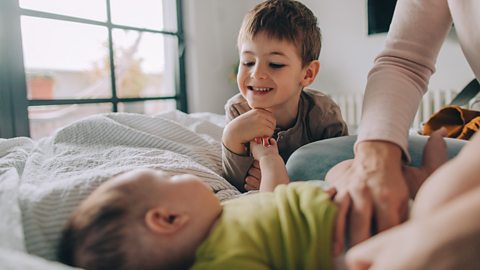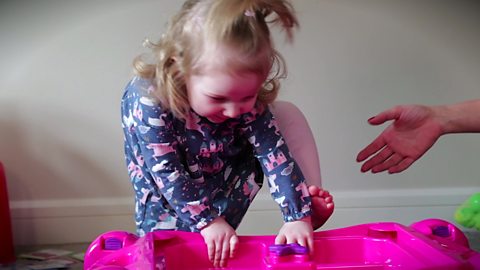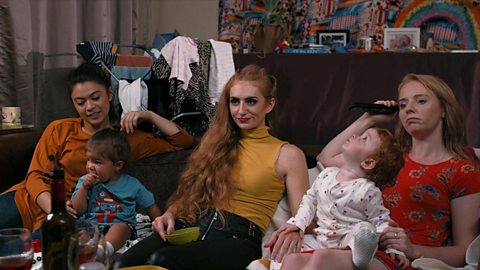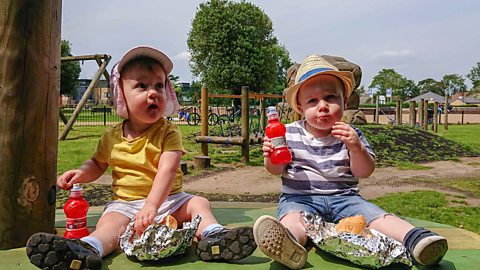
Hannah has noticed something unusual about how her 2-year-old twin sons Henry and Albert interact.
'If theyãre sat playing, one of them will seem to say something that we donãt understand, but the other will hand them a toy as if theyãve just said ãpass me thatãã.
Danielle has spotted something similar with Aria and Isaac aged 20 months. ãWhen theyãre playing together youãll hear them [babbling on], itãs like theyãre having a conversation with each other but you canãt understand any of the words theyãre saying.ã
ãWhen I think about it, it is like theyãre speaking their own language.ã
If theyãre sat playing, one of them will seem to say something that we donãt understand, but the other will hand them a toy like theyãve just said ãpass me thatã.
Twin languages
Both families are based in Greater Manchester, and you might think there's something in the water, but it turns out that what the two mums have experienced is not as unusual as it sounds.
Some studies suggest that as many as half of twin pairs might develop what sounds like their own language, one which is foreign to their parents, but which they seem to both speak and understand together. For an example of an apparent ãtwin languageã in action, take a look that went viral back in 2011.
Watching twin babies interact, itãs easy to jump to the conclusion that theyãve miraculously invented a language all of their own. As Danielle says, ãitãs the expression they put into it ã their tone goes up and down like you and me speaking, and itãs back and forth like a proper conversationã.
ãÎtheir tone goes up and down like you and me speaking, and itãs back and forth like a proper conversation.
What's going on?
To understand what's really going on, we need to look more closely at the ways twins learn language in their early years.
As with all babies, twins start by trying to copy the sounds of the languages that their parents use, but not quite getting it right. This is what Professor Dorothy Bishop from the University of Oxford calls 'immature speech sounds'.
And given how close they are in age, twins spend a lot of time together. As Danielle tells us, Aria and Isaac spend hours playing, without needing much prompting from their mum and dad.
This means that once twins start exploring what sounds they can make, they're hearing a lot of one another's immature speech sounds.
Hearing each other make the same sounds over and over again, they might start to pick up a bit of meaning from them. This reinforces these wrong sounds, so they'll carry on using them with one another. This is what makes it sound like they're using a different language.
So, this means that twin languages are usually just a form of the twins' parentsã languages after all.
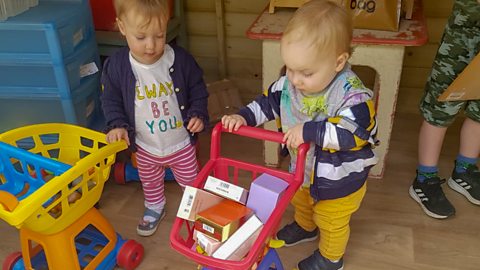
Moving on
Eventually, twins need to start making the right sounds for objects in order for other people around them, like their parents and other family members, to understand. This is why twin languages usually get phased out pretty quickly, usually entirely by the time they go to school.
Aria is already showing signs of moving on ã while she will babble away with her brother in twin speak, she uses real words like ãdoggyã when speaking to her parents.
Language delay in twins
While listening to twin toddlers speaking their alien languages can be very cute, it can also be one of a number of reasons twins take longer to learn languages, as they get used to copying each other.
According to the , twins are often about 6 months behind other children when it comes to speech development.
Other factors that can have an impact include:
parents dividing their attention between the two
the lack of eye contact they get as parents look from one to the other
competition between them in order to be heard
one twin speaking for the other
What can parents do?
This isnãt cause to panic. According to , twins with language delays usually catch up.
Hannah says they have all sorts of ways of making things work for them as a family. ãInitially we were worried, but weãre able to meet the boysã needs, whether they point at things, gesture, or make different soundsã.
If youãre a parent of twins, the NHS recommends a number of ways you can help to avoid or reduce language delays:
make the most of one-on-one time, talking through individual nappy changes and bath times
turn the telly off for at least 30 minutes a day so babies can concentrate on your voice
pay attention to sounds each baby makes and respond to them
make time for one-to-one play with each twin, face-to-face and using their names
encourage other family members to talk and play with twins individually too

Although most twins do catch up with their language learning, it's best to seek advice if language problems are ongoing, particularly when they reach the age of 4 years old. If you are a parents of twins and you are concerned that they might be falling behind with their language learning, speak to your health visitor, who may refer you to a speech and language therapist.
For more information about raising twins, check out .
Article produced with help from Professor Dorothy Bishop, Department of Experimental Psychology, The University of Oxford.

